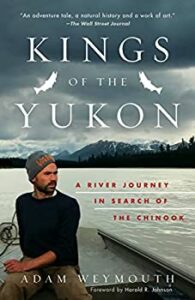Kings of the Yukon

By Jeremiah Wood
Alaska rivers teem with salmon throughout the summer. Or at least they used to. An alarming decline in salmon runs in recent years has brought massive changes to the way subsistence, sport and commercial interests operate.
The king salmon, a local name for the species commonly referred to as chinook, has been the most important fish species in the lives of people up and down the Yukon River for centuries. Most suited of all the salmon species for human consumption due to its high nutritional value, oily meat and excellent taste, the king salmon has been traditionally harvested in nets and fish wheels, and smoked, dried or frozen to preserve for eating throughout the year.
Salmon Return
But recently, returns of chinook salmon from the ocean have been so dismal that fishing for them has been severely curtailed some years, completely shut down in others. The inability to fish for salmon has changed lives, challenged food security for local villages, and threatens to cut cultural ties to the land and river. It’s also managed to pit interests against each other, fueling disputes among villages and user groups, and even stressed international relations: the Yukon and its fish know no borders, but are present in both Canada and the U.S.
Adam Weymouth became aware of the Yukon and the complexity of its salmon problem while covering stories in Alaska as a journalist from England. At the time, a group of Yup’ik fishermen from the Yukon’s sister river, the Kuskokwim, were on trial for challenging a Fish and Game closure on the Yukon, continuing to fish during a closed season. The story and associated court case symbolized similar disputes over salmon whose importance grew as the runs further dwindled. It struck him as a broader story, one that needed to be told.
In the summer of 2016, Adam Weymouth began a journey that would last a season, a 2,000 mile paddle from the headwaters of the Yukon to the ocean. At each stop along the way he visited with local people who depend on the river and its salmon fishery for survival. He toured a Canadian salmon hatchery, stopped at local villages and heard from tribal elders, visited fish camps, interviewed homesteaders and tagged along on commercial fishing vessels.
The Challenges
Weymouth sat down with folks like Andy Bassich from TV’s “Life Below Zero”, Stan Zuray from “Yukon Men”, Richard Carroll from the native village of Fort Yukon, Holy Cross elder Mary Demientieff, and so many more. He explored the challenges faced by residents in one of the least populated places on earth, including the cost of living, access to food, alcoholism, isolation and depression. He also found positive things: the reward of living off the land, privacy, peacefulness, cooperation and community.
In his book, “Kings of the Yukon: A River Journey in Search of the Chinook”, Adam Weymouth tells the story of king salmon and the people affected by their decline. Woven into all the narratives, history and viewpoints, he also tries to get at the two big questions so many people have tried to answer in recent years: why have the salmon declined, and how do we bring them back? Everyone seems to have their own theories, and some seem to hold more merit than others, but the question remains unanswered. Perhaps only time will tell.
Jeremiah can be reached at [email protected].
For more articles about hunting, fishing and the great outdoors, be sure to subscribe to the Northwoods Sporting Journal.
